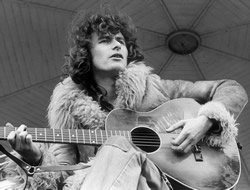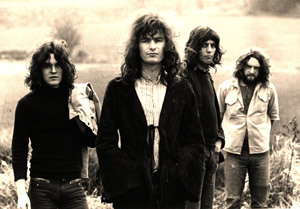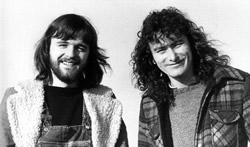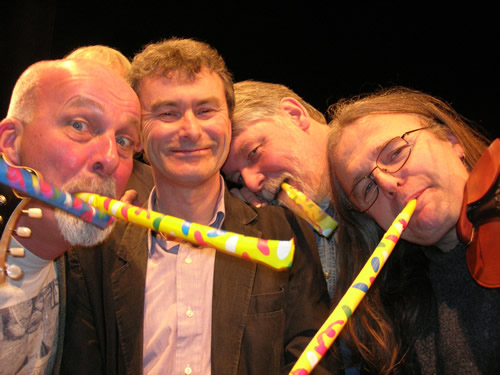Steve Ashley has always struck me as a fascinating figure of the British folk scene; his creative freedom and contemporary interpretation of English folk music gave us his innovative debut album, Stroll On. Despite being released in 1974, it was way ahead of its time then and sounds as fresh and innovative today. The musical path he chose was certainly not the well-trodden and although he’d probably laugh at the idea of what he did as being daring and uncoventional, it was not the norm.
He is without doubt one of British folk’s finest singer-songwriters and this year marks his fiftieth year since he started singing in folk clubs. Over the course of this interview Steve has always come across as being very humble about his music and his influence on others. He was genuinely moved when we spoke of young artists who had taken inspiration from his work or covered his work, ironic for a man whose songs have been recorded by the likes of Fairport Convention, Anne Briggs and Martin and Jessica Simpson.
Whilst he continues to take it all in his stride we felt it would be good to introduce him to more of you and for those of you that know and love his music to hear about it all from the man himself…in his own words.
Can you tell us about your early folk years and some of the key influences that came to shape your music style?
I first saw live traditional music in 1962, in a concert featuring Ewan MacColl, Peggy Seeger, Bert Lloyd and Alf Edwards, The McPeakes and Anne Briggs (in one of her first public appearances). And it had a profound effect upon me. Prior to that, I’d heard American folk songs via Lonnie Donegan and The Kingston Trio. I was at Ealing Art College at the time doing the same course as Pete Townshend, although he was in the year ahead. One day I heard him playing mouthorgan in a corridor and when I asked him which one was best for playing blues he suggested an Echo Super Vamper, and to get one from Jim Marshall’s music shop in West Ealing. So I did, and I’ve been playing mouthorgan ever since.

Steve in 1972
Anyway, shortly after the Hayes concert I began learning songs from various Topic albums and started singing them in the clubs of West London. I also developed my left-handed guitar technique using a right-handed instrument. Then, in 1964 I moved down to Maidstone Art College and met Peter Bellamy. And I joined him as a resident singer at the Maidstone and Rochester folk clubs. After a year or so Pete left for London to follow his musical path and later formed The Young Tradition. And I returned to London in 1967 to start work at The Observer alongside Austin John Marshall, who later became my manager when I formed a duo called The Tinderbox with the guitarist Dave Menday.
My main influence for song writing was English traditional songs, but other writers made a considerable impact on me too. At the forefront was Ewan MacColl, along with Cyril Tawney and Sidney Carter. They were all writing songs in styles that sat comfortably alongside traditional material. But the most important aspect of traditional songs for me was the fact that they reflect the lives of past generations. And I saw them – and still see them – as contemporary songs from the past. So rather than write songs about past events in archaic language, I was determined to write new songs with original melodies and lyrics that focused upon my own contemporary experience, in a way that carried forward some of the essence of traditional songs. I was also determined to sing with my own accent.
Another key influence at that time was Robin Williamson and the creative freedom that both he and Mike Heron brought to song structures in The Incredible String Band. But while they carried musical influences from various global traditions, I was focused upon making English music. In 1968 I wrote ‘Fire and Wine’ a wintertime celebration of the great music that was coming out of the clubs. I became friends with Anne Briggs around that time and she recorded the song before I did. They were heady times, and once I’d got my confidence, the songs came tumbling out. Eventually, after a stressful three years of record company rejections, Austin John Marshall landed a deal for a solo album for me which finally appeared in 1974 as ‘Stroll On’.
During the waiting period I was invited to be part of the first touring line-up of The Albion Country Band with the ex-Fairporters, Ashley Hutchings, Simon Nicol and Dave Mattacks. I shared lead vocals with my old friend Royston Wood (from The Young Tradition), and the sixth member was the great American fiddle player, Sue Draheim. We didn’t stay together for very long but the gigs were good and so was the music, in spite of the fact that we were all pulling in different directions. We played a Morris set to dances by Chingford Morris (who later became Albion Morris).

Ragged Robin 1973
After the Albions I formed my own band, ‘Ragged Robin’ but lack of funds caused us to break up pretty soon too. But we recorded an album with Anne Briggs which came out 25 years later as ‘Sing a Song For You’. After that, in the autumn of 1973 I initiated a new club in London called ‘Merlins’. The idea was for a group of resident performers to try out new songs in an informal setting. I approached various songwriters and friends, until our final group of residents was: Richard Thompson and Linda, who was then Linda Peters, with Simon Nicol in a trio called Sour Grapes, plus Robin and Barry Dransfield, Lea Nicholson, me and Richard Byers from Ragged Robin. Between us we each chose some great guest artists – Sandy Denny, Bert Lloyd, The Etchingham Steam band, members of The Young Tradition, Dick Gaughan and many more. It lasted for a couple of months until touring and other commitments took everyone off onto different paths.
When ‘Stroll On’ finally appeared, Folk Review (the fROOTS of the day) awarded it Contemporary Folk Album of the Year, and a year later it was distributed in the USA by Motown, along with the follow-up Speedy Return. As a result, I did a six week solo tour of the States supporting people like Gene Clark, Chris Hillman, Leon Redbone and Tracy Nelson. In the UK I did support tours with Planxty and Supertramp.
An important element in the success of these first two albums, ‘Stroll On’ and ‘Speedy Return’ was the orchestrations of the late Robert Kirby. I wanted to hear Vaughan Williams style string arrangements to augment the Englishness of the songs and Robert completely understood that. He recognised the connection between Vaughan Williams and the English tradition and it’s no co-incidence that many years later, Cecil Sharp House was the venue for Robert’s Memorial Concert. It was his favourite venue. Anyway, we hooked up again when I celebrated my Sixtieth and he put together a chamber orchestra for that concert and then later wrote some new arrangements which appeared on my most recent album ‘Time and Tide’. We also performed a few orchestral concerts together, the last of which was headlining at Cheltenham Folk Festival in 2009. Sadly, Robert died a few months afterwards.
Robert Kirby Memorial Concert at Cecil Sharp House (Steve’s performance is 2:28 minutes into this video)
After ‘Speedy Return’ was released in America, the record label, Gull lost the deal with Motown and went out of business shortly after. I found it very hard to find a new label for my next album so in the end Dave Pegg offered to release it on Fairport’s new label, Woodworm Records. With this one, ‘The Family Album’ all the songs related to various members of an imagined family. With Dave Pegg, Bruce Rowland, Simon Nicol and Chris Leslie this was very much a ‘Fairport project’ (although Chris, who was to join Fairport many years later, was working with me in a duo in those days).

With Chris Leslie in a duo in 1979
Shortly after that however, the focus of my song writing became more political, and the cassette albums I made for the Peace Movement in the 1980s were an important turning point for me. Politics was always part of the mix, but in this case the songs reflected my active involvement in the campaign. Around this time I increased my commitment to the ‘Steve Ashley Band’ with trumpets, fiddle, and a folk-rock backline. It was formed in 1978 for The Rotterdam Folk Festival and we kept it going on and off for around 10 years. We made an album together in 1990 called ‘Mysterious Ways’ but a couple of years later I retired completely from recording and live performance. I’d often taken a break from the scene but this one was to last eight years.
The folk scene had lost its edge for me, and I was finding more inspiration writing and designing materials for charities and pressure groups in overseas development, environmental campaigns and social issues. I learned a great deal about the world outside during those years and worked with some inspiring individuals, especially in the Peace Movement. But in the end, out of the blue, I was contacted by a new record label, Market Square, and they wanted to reissue ‘Stroll On’ in updated form. When I persuaded them to release a 30-year anthology at the same time (The Test Of Time), I soon found myself back on the road again. And after all that time I was happy to be there. In 2000 I signed a two-album deal with Topic Records and they released ‘Everyday Lives’ in 2001 and ‘Time and Tide’ in 2007.
Looking back, it has been an amazing journey, with many changes along the way. But whatever changes of direction I’ve made I have tended to work with friends I’ve known and trusted musically for a very long time. So I’ve worked consistently with Robert Kirby, Dave Pegg, Chris Leslie, Simon Nicol, Danny Thompson, Dik Cadbury and Al Fenn, among many others. I was also very fortunate to have Robin Williamson on the last two releases for Topic.
So when you ask about my influences, there have been many. And traditional music has always been there as a kind of undercurrent, but never as a constraint. I still need the freedom to explore other musical forms and I often include elements of jazz, rock or blues, or whatever suits the song. The lyrical content is crucial and these days most of the songs are political to a greater or lesser degree. I write about what I feel and what I see in the everyday lives of people living in Britain in these weird and crazy times.
Steve Ashley with the late Robert Kirby conducting Staccato Strings (Cheltenham Folk Festival 2009)
You have been quoted as an inspiration by a number of younger artists on the British folk scene today; it must feel strange to see the music you made go full circle.
It’s always gratifying when other people pick up the songs or express their appreciation. When Anne Briggs recorded ‘Fire and Wine’ right at the beginning, it was a real validation. And every song cover since then has been special in some way. St Agnes Fountain’s version of ‘Spirit of Christmas’, Bill Zorn’s ‘Over There In Paradise’ and Maggie Boyle’s ‘Once In A While’, they each carry a different atmosphere from my original recordings. Years ago, The Australian band, The Bushwackers asked me to do a setting of Henry Lawson’s poem Past Carin’ and there have now been something like a dozen versions of that. The thing is I don’t always get to hear them. The other day I read that someone had a home recording of Steve Knightley singing ‘The Duke of Cambridge’. I had no idea he’d sung that.
At one time Steve was part of The Arizona Smoke Review and they did two other songs of mine, ‘Mysterious Ways’ and ‘Feeling Lazy’. This was with Bill Zorn, Paul Downes and Phil Beer of course. Phil also did ‘The Rough with the Smooth’ and apparently he’s now doing ‘Fire and Wine’ on his solo gigs. And that’s great. It’s really encouraging that the early songs still mean something to people after all this time. It also amazes me that artists find so many ways to interpret them. Recently, one song from ‘Time and Tide’, ‘Best Wishes’ had three different treatments at the same time. Fairport did a five-part harmony version, Grace Notes did a three-part version, and Wizz Jones played it on the banjo.
With regards to younger artists, I did a gig with Adam Leonard a while back and he explained how Stroll On had been inspirational for him and he told me about The Owl Service including a verse from ‘Fire and Wine’ on their album. With Facebook and Myspace it’s been a lot easier for people send me feedback. The New Zealander songwriter, Wayne Gillespie, and Ben Tweddell with his band Thistletown, both cite Stroll On as an inspiration. And then there is Sproatly Smith’s recent version of ‘Candlemas Carol’ so yes, it’s amazing really after all this time. Then last month, a young guy from a folk-rock band called Green Diesel, showed up at a gig and asked if they could record ‘Fire and Wine’ on their new album called, ‘Now Is The Time’.
Now is the time indeed – 44 years on – for fire and wine…

with Peggy, Simon and Chris (Fairport Convention) for Steve’s sixtieth birthday bash in 2006
